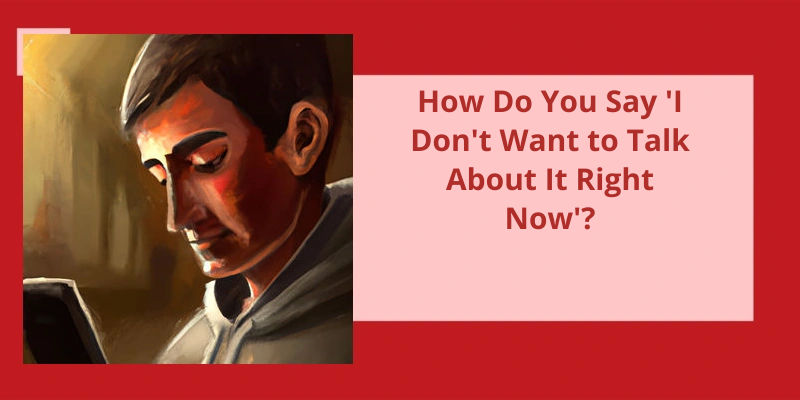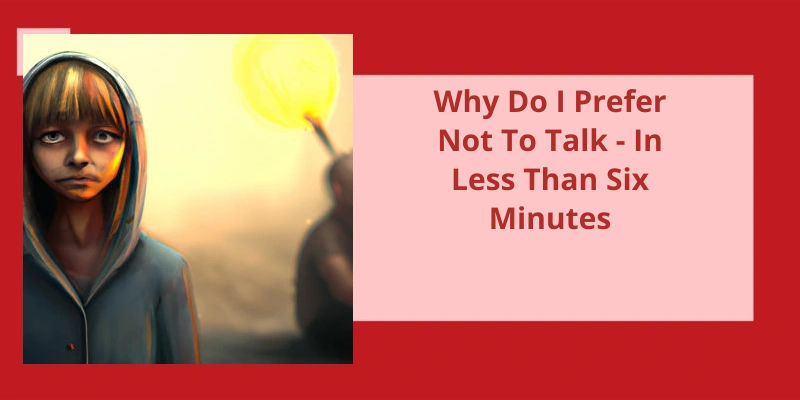The human mind is a complex web of emotions, instincts, and intuitions that works in mysterious ways. In relationships, it isn’t uncommon to be drawn to someone who appears to be incredibly friendly, charming, and agreeable. However, some may wonder whether being too friendly is a red flag. While we usually assume that it's better to be too nice than not nice enough, it's essential to be aware of the darker side of excessive friendliness. Therefore, it's crucial to tread carefully and pay attention to our intuition when someone seems too good to be true.
What Is a Friendship Flag?
Friendship is an essential part of life, but it’s not always easy to determine who’s a good friend and who isnt. Thats where the friendship flag comes in. A friendship flag is a tool that can help you identify the warning signs of a bad friendship. It’s a simple concept – color the flag green if it describes a good friend and red if it describes something that a friend shouldnt do.
One common friendship red flag is when a friend is consistently negative or critical. While it’s normal for friends to offer constructive criticism, if someone is always tearing you down or pointing out your flaws, they may not have your best interests at heart. Similarly, a friend who gossips behind your back or talks about others in a negative way may not be trustworthy.
Another red flag in a friendship is when someone consistently cancels plans or is consistently unreliable. A true friend will make an effort to keep plans and be dependable. If someone is constantly cancelling last minute or leaving you hanging, it may be time to rethink the friendship.
A friend who disregards your feelings or treats you poorly is also a red flag. A good friend will listen when youre upset or have a problem, and they’ll respect your feelings and boundaries. If someone consistently ignores your feelings or treats you disrespectfully, it may be time to move on.
A true friend will encourage you to be yourself and pursue your own interests. If someone is always trying to control your actions or manipulate you, it may be a sign of a toxic friendship.
On the other hand, there are plenty of behaviors that warrant a green friendship flag. A good friend will listen and offer advice, but they’ll also respect your decisions and support you. They’ll be honest and truthful, but also tactful and compassionate. They’ll make time for you and be there when you need them.
By paying attention to the actions and behaviors of those around you, you can determine whether a friendship is healthy and supportive or toxic and draining.
It’s important to recognize these red flags early on to avoid falling into a harmful situation. In this article, we’ll explore some common red flags to look out for in different aspects of life.
What Are Considered Red Flags in a Person?
In friendships, red flags may present themselves through excessive criticism, gossiping, jealousy, and instability. These warning signs can also show up in the workplace, such as when someone consistently shows up late, is unproductive, or dishonest. Regardless of the context, it’s essential to take notice of these warning signs, as they can be indicative of larger issues.
One of the most significant red flags isn’t being able to take responsibility for ones actions. Individuals who refuse to admit fault or blame others for their mistakes are often unreliable and untrustworthy. Additionally, dishonesty and deception are other major warning signs, as it can indicate a lack of integrity and a tendency to manipulate others. Lack of empathy is another significant red flag, as it can manifest in cruelty towards others, particularly in situations where the individual isn’t directly impacted.
Another common red flag is self-centeredness. Those who prioritize their needs above others or never ask how others are doing are oftentimes narcissistic and lack the ability to connect with others on a deep level. Similarly, individuals who’re always negative, critical, or complain may have underlying issues with anger, depression, or anxiety. These negative behaviors can cause them to be difficult to work or interact with, making it challenging for others to maintain a healthy relationship with them.
In some cases, red flags may not be as obvious. For example, individuals who’re overly accommodating or are unwilling to stand up for themselves may have codependency issues. These people may struggle with boundary-setting and fear saying no to others, often leading to cases of emotional burnout and exhaustion. It’s crucial to be aware of these warning signs to avoid being taken advantage of.
The School of Life has shed some light on the behavior of overly-friendly people and provided an interesting insight into their motives. In their latest video, they explore why these people tend to be so irritating, and it seems that what they believe to be attentive behavior may actually indicate a lack of attention. Learn more about this fascinating topic and gain a better understanding of why some people can push your limits in the following paragraphs.
What Does It Mean if Someone Is Overly Friendly?
Rather, theyre just trying to please you and avoid conflicts. This can stem from a fear of rejection or a deep-seated need for approval. Overly friendly people may also have a hidden agenda, such as trying to manipulate you into doing something for them or gaining something from the relationship.
Another issue with overly friendly people is that they may not respect boundaries. Theyll try to insert themselves into your life or pry into personal matters without realizing that theyre overstepping. This can be especially frustrating if youre introverted or prefer to keep things private. Overly friendly people may not understand that not everyone wants to be constantly surrounded by others or share every detail of their life.
When someone is overly friendly, theres also the question of authenticity. Are they really interested in you and your life, or are they just trying to be likable? This can lead to a sense of distrust and make it difficult to form genuine connections with others. It can be hard to know whether someone is being friendly because they genuinely enjoy your company or because theyre trying to manipulate you in some way.
One reason for such behavior may stem from a lack of self-awareness. They might not be aware of how their actions are affecting others. This can be a difficult issue to address without hurting someones feelings, but it’s important to communicate your needs and boundaries in any relationship.
Lastly, being overly friendly can actually backfire and cause the opposite effect. People may feel suffocated or overwhelmed by the constant attention and back away from the relationship altogether. It’s important to strike a balance between being friendly and respectful of others boundaries and personal space. Ultimately, genuine connections are formed by being authentic and allowing others to be their genuine selves as well.
How to Set Boundaries With Overly Friendly People
- Be honest about your own boundaries and communicate them clearly.
- Use “I” statements when expressing your discomfort.
- Avoid getting defensive or aggressive.
- Say “no” when you need to.
- Don’t feel guilty for setting boundaries.
- Be consistent with your boundaries.
- Know when to seek professional help.
In social situations, encountering someone who’s overly friendly can be a challenge. It’s important to navigate these interactions with care, as dismissing or belittling their efforts may come off as rude or insensitive. However, there are ways to politely convey your boundaries without risking hurt feelings or misunderstandings. Here are a few tips to keep in mind.
How Do You Deal With Someone Who Is Overly Friendly?
It’s important to set boundaries with people who’re overly friendly, especially if their behavior is making you uncomfortable. While it’s tempting to just go along with their friendliness in order to keep the peace, it’s not healthy to constantly suppress your own needs and feelings. Instead, try to be assertive without being aggressive. Let the person know that you appreciate their kindness but that you also need your own space.
It can be tricky to strike the right balance between being polite and being firm, but it’s essential to communicate your needs clearly. You might want to practice what you want to say beforehand so that you feel more comfortable expressing yourself. It’s also important to remember that the persons friendliness may be coming from a good place, so try not to be too harsh in your delivery.
At the same time, it’s important to be consistent in your boundaries. If the person continues to be overly friendly despite your requests, you may need to take more drastic action. This might include limiting your interactions with them or even cutting ties altogether. It may be difficult, but it’s important to prioritize your own needs and wellbeing above anyone elses.
If youre finding it difficult to deal with someone who’s overly friendly, it can be helpful to talk to a trusted friend or counselor. They may be able to offer you support and guidance on how to navigate the situation. Ultimately, it’s important to remember that you’ve the right to set boundaries and take care of yourself. Dont be afraid to do whats best for you, even if it means having difficult conversations or making tough decisions.
How to Handle Overly Friendly Colleagues or Coworkers in a Professional Setting.
- Set boundaries by politely declining invitations to personal events or outings.
- Redirect conversations back to work topics.
- Avoid sharing personal information that could encourage overly friendly behavior.
- Stay professional, but friendly.
- If necessary, speak to a supervisor or HR representative for assistance.
It’s great to be friendly and accommodating, but as with anything, there can be too much of a good thing. When you never express your own preferences or opinions, it can hinder your ability to truly connect with others on a deeper level and be taken seriously. This can even have an impact on your professional life. So, while being pleasant is important, it’s also important to assert yourself and stand up for what you believe in.
What Happens if You Are Too Friendly?
At first, being overly friendly and kind might seem like a positive trait to have. People are drawn to those who’re approachable and easy to talk to. However, there’s a thin line between being respectful and being a pushover. If you’re too friendly, it can lead to people taking advantage of you. For example, your coworkers might delegate all their work to you because they know you won’t say no.
Moreover, an excessively nice person might never be really known on a deep level or taken seriously. When you’re too friendly, people might assume that you’re always happy-go-lucky, and your emotions don’t run deep. You might be seen as someone who’s always agreeable and doesn’t have an opinion of their own. Therefore, it can be difficult to form meaningful relationships with coworkers or friends who don’t take you seriously.
Being too accommodating can make you a bit invisible, because you never stand for anything. If youre always going along with what someone else wants, then your opinions will never get heard. It can also be seen as a sign of weakness, which could be detrimental to your career. If your coworkers or boss think youre a pushover, then they might not trust you with important tasks or promotions.
Furthermore, an excessively friendly person may not have healthy boundaries. It’s important to know when to say no and set boundaries with people. If you dont, people will take advantage of your niceness, leaving you burnt out and stressed.
In some cases, being too nice can even be harmful to your mental and emotional wellbeing. You might find yourself constantly putting others needs before your own, leaving you depleted and unhappy. It’s important to practice self-care and prioritize your own needs.
Overall, being too friendly can have it’s downsides. It’s important to strike a balance between being kind and respectful and setting healthy boundaries for yourself. By doing so, you can build more meaningful relationships, earn respect in the workplace, and prioritize your own needs.
Conclusion
In conclusion, being too friendly can be a red flag in relationships. It’s important to trust your intuition and take note of any gut feelings you might have. While it’s easy to be blinded by someone's charm, it’s necessary to step back and assess the situation objectively. Love bombing and early signs of abuse can masquerade as excessive kindness, so it’s essential to pay attention to any unusual behaviors. Remember that being kind and being overly nice aren’t the same thing. True kindness is genuine and respectful, while someone who’s too nice may have ulterior motives. Trust yourself, trust your instincts, and prioritize your safety and well-being above all else.






